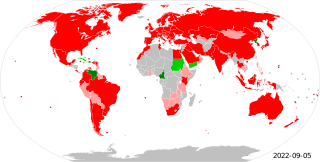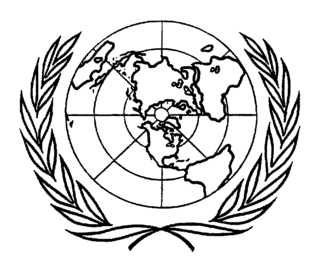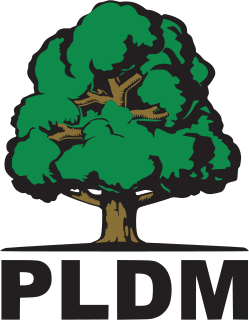
The International Maritime Organization is a specialised agency of the United Nations responsible for regulating shipping. The IMO was established following agreement at a UN conference held in Geneva in 1948 and the IMO came into existence ten years later, meeting for the first time in 1959. Headquartered in London, United Kingdom, IMO currently has 175 Member States and three Associate Members.

The International Labour Organization (ILO) is a United Nations agency whose mandate is to advance social and economic justice through setting international labour standards. Founded in October 1919 under the League of Nations, it is the first and oldest specialised agency of the UN. The ILO has 187 member states: 186 out of 193 UN member states plus the Cook Islands. It is headquartered in Geneva, Switzerland, with around 40 field offices around the world, and employs some 3,381 staff across 107 nations, of whom 1,698 work in technical cooperation programmes and projects.

The International Red Cross and Red Crescent Movement is a humanitarian movement with approximately 97 million volunteers, members and staff worldwide. It was founded to protect human life and health, to ensure respect for all human beings, and to prevent and alleviate human suffering. Within it there are three distinct organisations that are legally independent from each other, but are united within the movement through common basic principles, objectives, symbols, statutes and governing organisations.

The Metre Convention, also known as the Treaty of the Metre, is an international treaty that was signed in Paris on 20 May 1875 by representatives of 17 nations. The treaty created the International Bureau of Weights and Measures (BIPM), an intergovernmental organization under the authority of the General Conference on Weights and Measures (CGPM) and the supervision of the International Committee for Weights and Measures (CIPM), that coordinates international metrology and the development of the metric system.

The International Climbing and Mountaineering Federation, commonly known by its French name Union Internationale des Associations d'Alpinisme, was founded in August 1932 in Chamonix, France when 20 mountaineering associations met for an alpine congress. Count Charles Egmond d’Arcis, from Switzerland, was chosen as the first president and it was decided by the founding members that the UIAA would be an international federation which would be in charge of the "study and solution of all problems regarding mountaineering". The UIAA Safety Label was created in 1960 and was internationally approved in 1965 and currently (2015) has a global presence on five continents with 86 member associations in 62 countries representing over 3 million people.

The Inuit Circumpolar Council (ICC), formerly Inuit Circumpolar Conference, is a multinational non-governmental organization (NGO) and Indigenous Peoples' Organization (IPO) representing the 180,000 Inuit, Yupik, and Chukchi peoples people living in Alaska, Canada, Greenland, and Chukotka (Russia). ICC was ECOSOC-accredited and was granted special consultative status at the UN in 1983.
The International Commission for Optics (ICO) was created in 1947 with the objective to contribute, on an international basis, to the progress and dissemination of the science of optics and photonics and their applications. It emphasises the unity of the crossdisciplinary field of optics.

The United Nations Committee on the Peaceful Uses of Outer Space (COPUOS) is a United Nations committee whose main task is to review and foster international cooperation in the peaceful uses of outer space, as well as to consider legal issues arising from the exploration of outer space.

The International Committee of the Red Cross is a humanitarian organization based in Geneva, Switzerland, and a three-time Nobel Prize Laureate. State parties (signatories) to the Geneva Convention of 1949 and its Additional Protocols of 1977 and 2005 have given the ICRC a mandate to protect victims of international and internal armed conflicts. Such victims include war wounded persons, prisoners, refugees, civilians, and other non-combatants.

The United Nations Conference on International Organization (UNCIO), commonly known as the San Francisco Conference, was a convention of delegates from 50 Allied nations that took place from 25 April 1945 to 26 June 1945 in San Francisco, California, United States. At this convention, the delegates reviewed and rewrote the Dumbarton Oaks agreements of the previous year. The convention resulted in the creation of the United Nations Charter, which was opened for signature on 26 June, the last day of the conference. The conference was held at various locations, primarily the War Memorial Opera House, with the Charter being signed on 26 June at the Herbst Theatre in the Veterans Building, part of the Civic Center. A square adjacent to the Civic Center, called "UN Plaza", commemorates the conference.
Georges Scelle was an international jurist and member of the United Nations International Law Commission.

The Massachusetts Provincial Congress (1774–1780) was a provisional government created in the Province of Massachusetts Bay early in the American Revolution. Based on the terms of the colonial charter, it exercised de facto control over the rebellious portions of the province, and after the British withdrawal from Boston in March 1776, the entire province. When Massachusetts Bay declared its independence in 1776, the Congress continued to govern under this arrangement for several years. Increasing calls for constitutional change led to a failed proposal for a constitution produced by the Congress in 1778, and then a successful constitutional convention that produced a constitution for the state in 1780. The Provincial Congress came to an end with elections in October 1780.

The Liberal Democratic Party of Moldova is a conservative political party in Moldova. The party is led by Tudor Deliu. Until 2016, PLDM was led by Vlad Filat, who was Prime Minister of Moldova from 2009 to 2013, in two cabinets. Immediately after the 2014 parliamentary elections, with 21 seats in the Moldovan Parliament, PLDM was the largest of the three democratic pro-European parliamentary parties.

The League of Nations was established with three main constitutional organs: the Assembly; the Council; the Permanent Secretariat. The two essential wings of the League were the Permanent Court of International Justice and the International Labour Organization.
The Alpine Town of the Year award is given to towns which have made exceptional efforts for the realization of the Alpine Convention and for sustainable development. The Alpine Towns of the Year are members of the international association of the same name.
Croatian Mountain Rescue Service is a national, voluntary, professional, humanitarian and non-partisan association working in the public interest. It is dedicated to preventing accidents, and providing rescue and first aid services in mountains and other hardly accessible or inaccessible areas as well as in extraordinary circumstances which require special know-how and equipment for preserving human, material and environmental resources.

The Civic Renovation Party is a political party in the Dominican Republic which was founded in 2006 as the Civic Renovation Movement by Jorge Radhamés Zorrilla Ozuna and a group of social-democratic Dominicans. The party was recognized by the Junta Central Electoral on December 16, 2009 and participated in the 2012 presidential elections, supporting Dominican Liberation Party candidate Danilo Medina through the Purple Alliance.

The Inter-American Commission of Women, abbreviated CIM, is an organization that falls within the Organization of American States. It was established in 1928 by the Sixth Pan-American Conference and is composed of one female representative from each Republic in the Union. In 1938, the CIM was made a permanent organization, with the goal of studying and addressing women's issues in the Americas.

Elections in Colorado are held to fill various local, state and federal seats. Special elections may be held to fill vacancies at other points in time.















